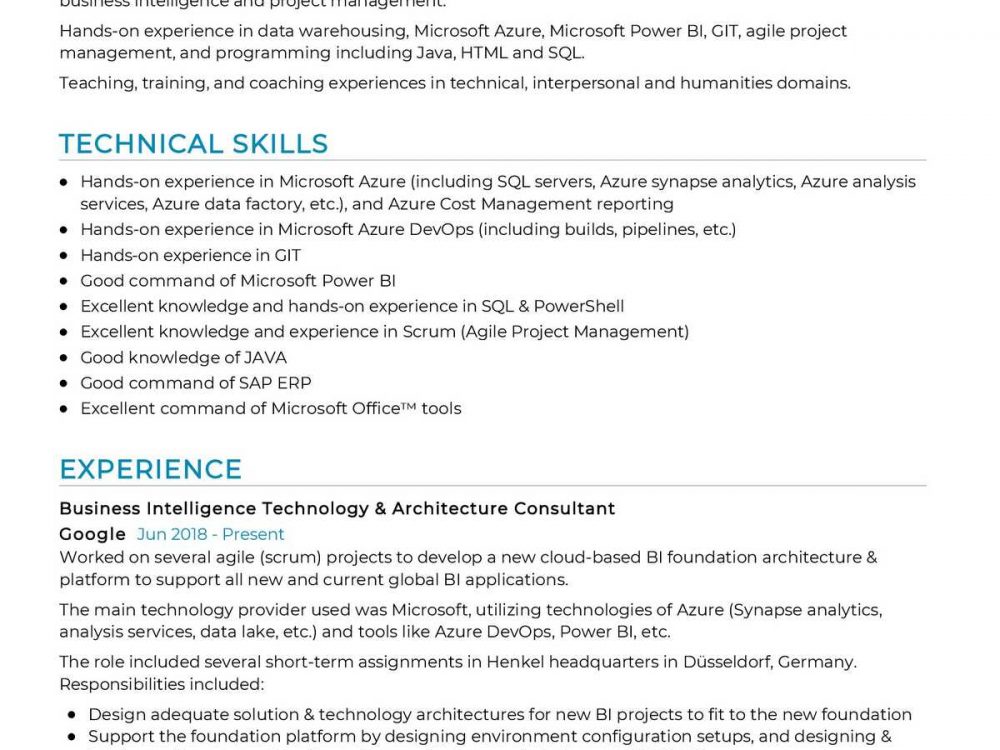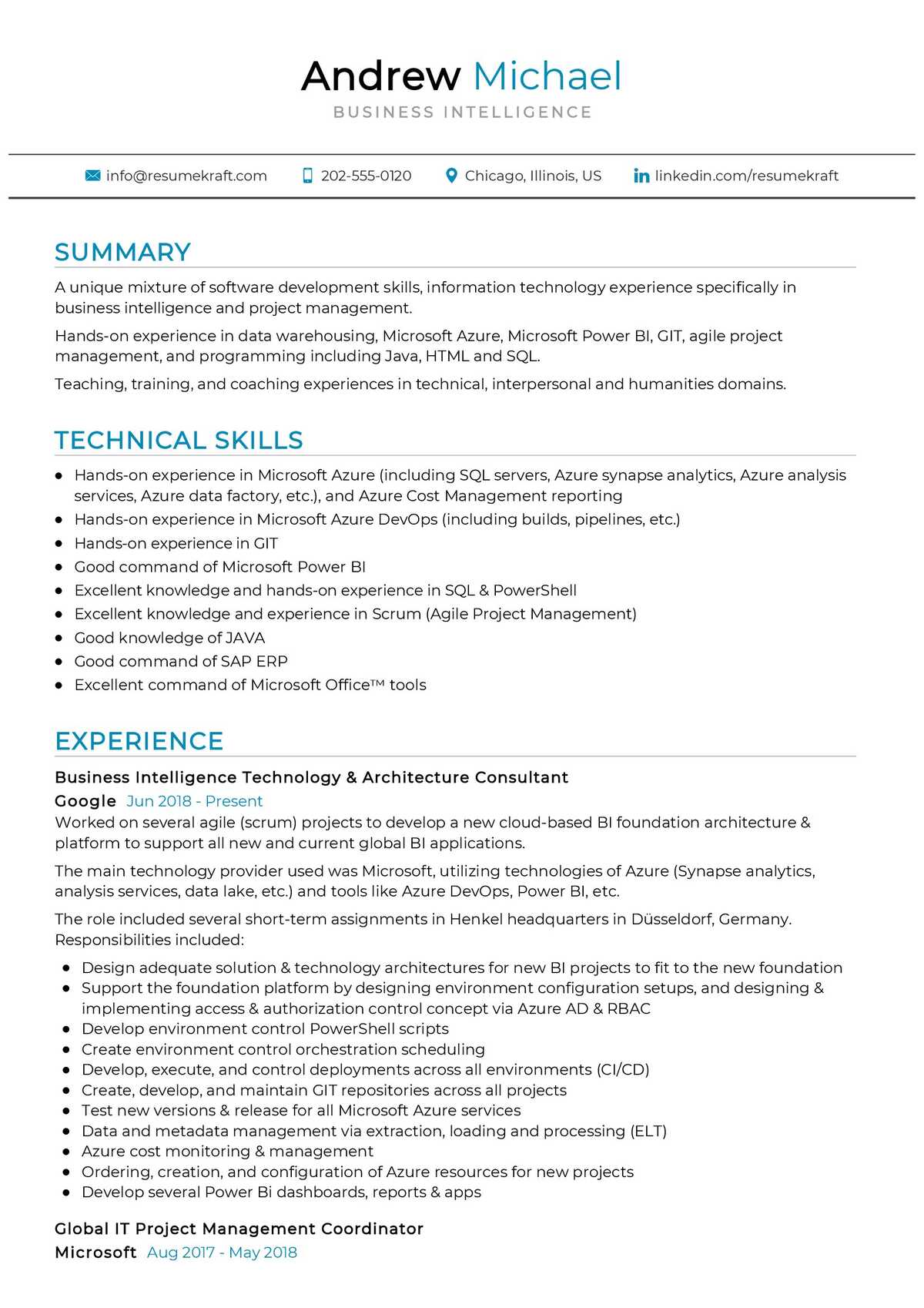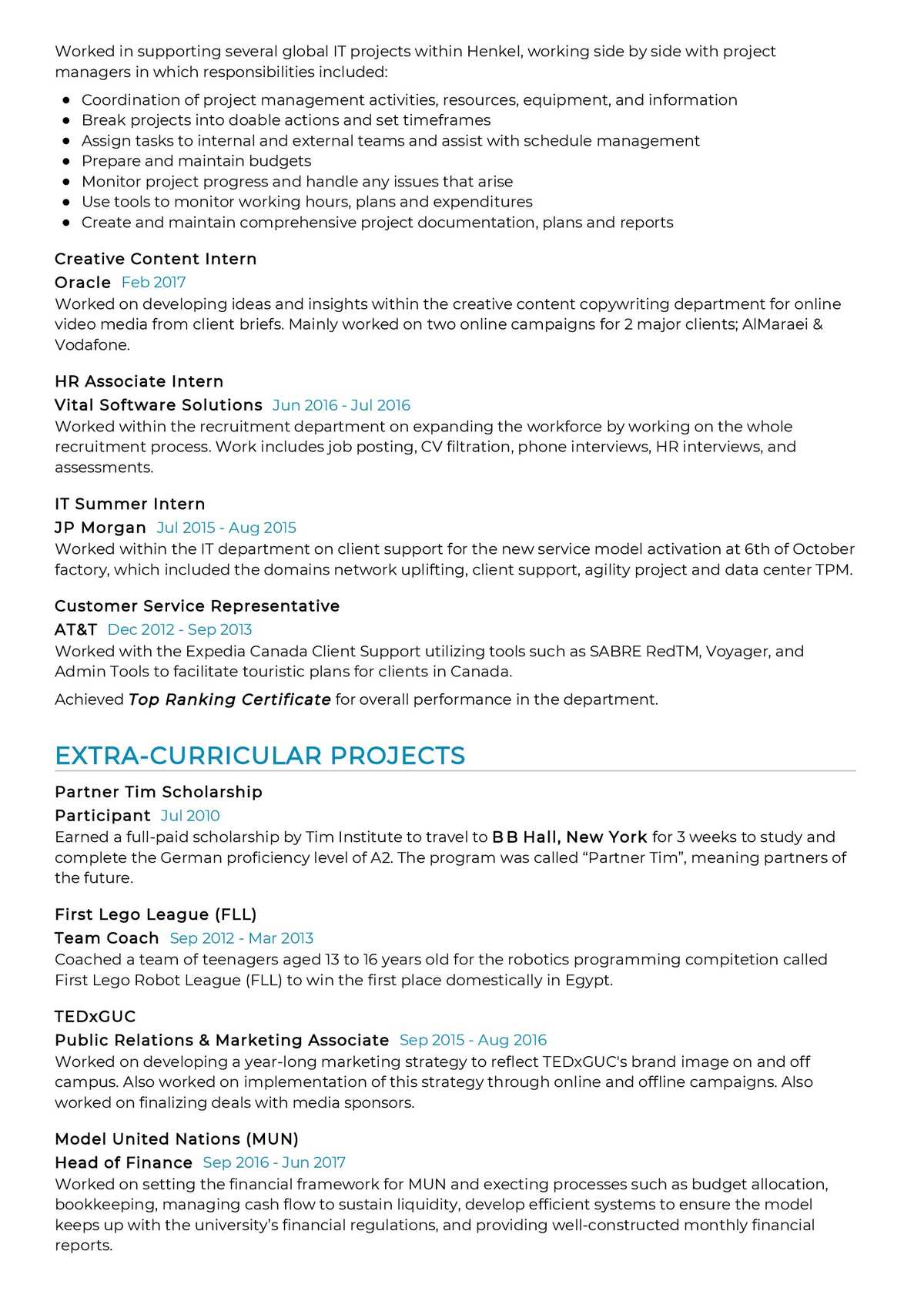What Should Be Included In A Business Intelligence Resume Sample Resume?
Having an effective resume when applying for a business intelligence job is essential for getting your foot in the door for an interview. A business intelligence resume sample resume should include certain elements that demonstrate your qualifications and experiences for the role.
When writing your resume for the role of a business intelligence analyst, it is important to focus on key skills related to the job. These include technical skills such as programming languages, statistical analysis and database management, as well as soft skills like presentation, communication and problem-solving. Your resume should also highlight any projects you have worked on, as well as any notable achievements or awards you may have earned.
When writing your resume, be sure to include your most current experience related to the position, as well as any past experience that could be relevant. Additionally, you should also include any certifications or memberships you may have that are related to the position. Be sure to list your education and any related coursework as well.
Finally, when writing a business intelligence resume sample resume, it is important to make sure that the document is properly formatted. This means that your resume should be organized in an easy-to-read manner, with appropriate headings and whitespace between each section. Additionally, be sure to include any keywords that are related to the position, as this will help you to stand out when your resume is scanned by potential employers . Be sure to also list any awards or recognitions you may have earned, as these can make you more attractive to employers.
What Skills Should I Put On My Resume For Business Intelligence Resume Sample?
Having an impressive resume is essential in order to land a job in the business intelligence field. Writing a business intelligence resume requires highlighting particular skills and experiences that show potential employers that you are the right candidate for the job. Here are some of the key skills and experiences to include when crafting your business intelligence resume sample.
First and foremost, it is important to demonstrate your technical skills when writing a business intelligence resume. You should include details about the various software programs you have expertise in and any experience you have working with data analysis tools. You should also discuss any programming languages you are familiar with and any databases you have worked on. Additionally, if you are familiar with any specialized tools or techniques for gathering data, be sure to include that information as well.
In addition to technical skills, your resume should also showcase your analytical skills. Business intelligence professionals need to be able to analyze data and develop strategies based on the information they have collected. It is important to provide an example of how you have used these skills in the past. You should also discuss any research you have conducted and any insights you have gained.
Finally, it is important to highlight any leadership experience you have when writing your resume. Many companies are looking for business intelligence professionals who can not only analyze data but can also take charge and lead team members. Show employers that you have the ability to motivate, guide, and inspire others by including examples of how you have led projects in the past.
By including these skills and experiences on your business intelligence resume sample, you will be able to show potential employers that you are the right candidate for the job.
What Is The Job Description Of The Business Intelligence Resume Sample?
Business intelligence (BI) is a rapidly growing field that requires a unique set of skills and experience. As businesses become increasingly reliant on data-driven decisions, the need for professionals who can transform data into meaningful information grows. A well-written business intelligence resume sample showcases the applicant’s ability to analyze, interpret, and present data-driven insights.
When writing a business intelligence resume sample, it is important to focus on the key skills and accomplishments that make the candidate stand out. This includes proficiency in using BI tools and techniques, such as data mining, predictive analytics, and dashboard development. Experiences with data visualization and presentation tools, such as Tableau, SAS, and Python, should also be highlighted. An understanding of data warehouse architecture, ETL processes, and database management are also essential.
Applicants should also include a section showcasing the projects they have completed and their role in the development process. This should include a detailed description of their responsibilities, the scope of the project, the outcome, and any challenges they faced. Finally, any certifications, awards, or other recognition should be included to demonstrate their experience and expertise.
By leveraging the skills and experiences listed on their business intelligence resume sample, candidates can demonstrate their ability to analyze and interpret data and present insights that drive business decisions. This is an essential skill for any BI job, and the resume should reflect a candidate’s proficiency in this area.
What Is A Good Objective For A Business Intelligence Resume Sample Resume?
When writing a business intelligence resume sample resume, it is important to include an objective statement that demonstrates your knowledge and experience in the field of business intelligence. A well-crafted objective statement can help to make your resume stand out from the competition. Your objective should be concise, direct, and emphasize why you are the best candidate for the role.
When crafting your objective statement, be sure to clearly identify your desired job title and explain how you can contribute to the organization. Include your key skills and qualifications, such as experience with data analysis, developing models, and creating reports. Additionally, include any special skills or certifications that you may have, such as a certification in business intelligence.
In addition to your objective statement, make sure that the rest of your resume supports your skills and qualifications. Include a summary of your relevant experience and demonstrate how you have applied your business intelligence skillset in past roles. Highlight your ability to interpret data, recognize trends, solve problems, and create strategies for the organization.
Finally, be sure to include any awards or recognition that you have received for your business intelligence work. This will show that you are a leader in the field and demonstrate your commitment to excellence.
By using these strategies in your business intelligence resume sample, you can increase your chances of securing a position in the field. A well-crafted resume with an effective objective statement can help you stand out in a competitive job market.
What Are The Career Prospects In The Business Intelligence Resume Sample?
Business intelligence (BI) is becoming increasingly relevant in today’s data-driven world. Whether you’re an IT professional, data analyst, or a business analyst, having a good BI resume sample is essential to secure a great job. The BI resume sample should be tailored to the specific job position you are applying for and should highlight your experience, skills, and achievements.
A great BI resume should include your educational qualifications, professional experience, and a strong list of skills. It’s important to showcase your analytical, problem-solving, and communication skills when writing your BI resume. This will demonstrate your ability to work with clients and teams to create effective business intelligence solutions. Additionally, it’s important to include any relevant projects or work you’ve done in BI, along with any certifications you’ve earned.
The career prospects for those with a BI resume sample are excellent. Professionals with a strong background in data analysis and business intelligence are in high demand as companies are increasingly looking for ways to utilize data-driven strategies for success. Companies are turning to professionals who have experience working with both technology and business operations to help them achieve their goals. It’s important to have a BI resume that showcases your skills and experience in this area to land a great opportunity.
In conclusion, having a well-crafted BI resume sample is essential for landing a great job in this field. Make sure to include your educational qualifications, professional experience, and a list of skills, along with any relevant projects or certifications. With the right resume and the right skills, you can take your career to the next level in business intelligence.
Key Takeaways for an Business Intelligence Resume Sample resume
A Business Intelligence resume sample can be an invaluable resource for job seekers interested in breaking into the field. A well-crafted resume can be a deciding factor in getting hired, so it is important to make sure that yours is up to date, relevant, and well-structured. There are a few key takeaways that job seekers should keep in mind when crafting their resume.
The first key takeaway is to make sure that you emphasize the relevant skills, experience, and education that you possess. Since Business Intelligence is a highly technical field, it is important to make sure that you are highlighting your technical skills and qualifications, such as SQL programming, data analysis, and database management. Make sure to include any certifications that you may have acquired, as well as any experience working with specific software, such as Tableau or PowerBI. Additionally, include any relevant coursework completed in college or professional training.
The second key takeaway for a Business Intelligence resume sample is to create a concise and structured document. Your resume should clearly highlight your strengths and qualifications, as well as any projects or initiatives that you have been involved in. The resume should be easy to read and organized, so that hiring managers can quickly identify your qualifications. Additionally, make sure to avoid using complex language or grammar, as this can be off-putting for hiring managers.
Finally, the third key takeaway is to make sure that you include references and contact information. Your resume should include at least two professional references, such as former employers or colleagues. Additionally, include your contact information, such as your email address and telephone number, so that potential employers can easily get in touch with you . This will ensure that your resume stands out, and that potential employers can easily reach out to you.



